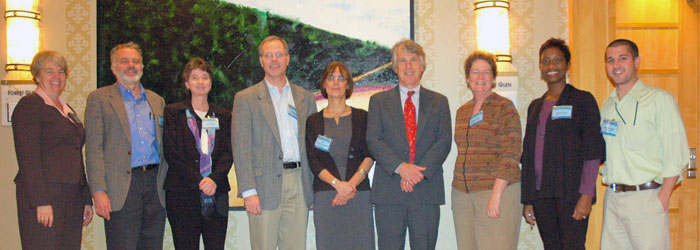2008 Cohort Consortium Annual Meeting
"Choosing Research Directions and Devising Consortial Strategies"
The annual Cohort Consortium meeting, sponsored by EGRP and the Division of Cancer Epidemiology and Genetics (DCEG), convened on November 4-6, 2008, in Bethesda, MD. The Cohort Consortium is an extramural-intramural partnership designed to facilitate the type of large-scale collaborations needed to assemble sufficient data and biospecimens for studies of gene-gene and gene-environment interactions in the etiology of cancer. View the 2008 Cohort Consortium Annual Meeting agenda.
Three new cohorts joined the Cohort Consortium in 2008: the Canadian Study of Diet, Lifestyle, and Health; U.S. Radiologic Technologists Cohort, and the Women's Lifestyle and Health Cohort. Their addition brings the total to 37 cohorts (24 of which are supported by EGRP) that have more than 4 million individuals from diverse populations. The cohorts range in size from 14,000 to more than 500,000 study participants. Some of them currently are enrolling participants while others have completed enrollment and are conducting follow-up. Although not all cohorts have biospecimens, DNA and/or serum biospecimens are available on more than 2 million individuals.
The Cohort Consortium has five active projects: the Breast and Prostate Cancer Cohort Consortium (BPC3), Vitamin D Pooling Project (VDPP), Pancreatic Cancer Cohort Consortium, Cancer Genetic Markers of Susceptibility (CGEMS) Project, and the newest project, initiated in 2008, the Body Mass Index (BMI) and Mortality Pooling Project. In addition to these projects, the Cohort Consortium Secretariat has approved 16 other projects which are at various stages of implementation.
Through the various projects, the Cohort Consortium membership is studying genetic variation in different cancer sites, serum vitamins, hormones and inflammation markers; using select questionnaire data for mega-data problems; exploring advances and challenges in methods for cohort studies; and addressing mortality and other non-cancer outcomes.

From left to right: Patricia Hartge, M.A., Sc.D., NCI Division of Cancer Epidemiology and Genetics (DCEG);
Robert N. Hoover, M.D., Sc.D., DCEG; Julie Palmer, Sc.D., Boston University; James Cerhan, M.D., Ph.D., Mayo Clinic;
Anne Zeleniuch-Jacquotte, M.D., New York University; Michael J. Thun, M.D., American Cancer Society;
Deborah Winn, Ph.D., NCI Epidemiology and Genomics Research Program (EGRP), Division of Cancer Control and Population Sciences (DCCPS);
Chinonye Harvey, M.P.H., EGRP; Geoffrey Tobias, DCEG. Not Pictured Daniela Seminara, Ph.D., M.P.H., EGRP.
The purpose of the 2008 annual meeting was to review scientific accomplishments and opportunities and devise the best research strategies for the next three years. Representatives of the member cohorts discussed challenges, reviewed and evaluated ongoing projects, considered proposals for new initiatives, and implemented a strategic plan to sustain the cohorts and their ongoing projects.
A workshop on research methodology for cohort and consortial studies fostered discussion of advances and challenges in research methods, expanding ascertainment of cancer and non-cancer outcomes, and statistical views of time and privacy in cohort studies. EGRP grantee Julie Palmer, Sc.D., of Boston University and the Black Women's Health Study, moderated the session on advances and challenges in research methods. The session included presentations by EGRP grantees Leslie Bernstein, Ph.D., of the City of Hope's Beckman Research Institute and Principal Investigator (PI) of the California Teachers Study, who discussed obtaining tumor blocks for breast cancer cases; and Susan Hankinson, Sc.D., of Harvard University and PI of the Nurses' Health Study I, who talked about data collection in an aging cohort.
EGRP grantee James Cerhan, M.D., Ph.D., of the Mayo Clinic and PI of the Iowa Women's Health Study, moderated a session on expanding the ascertainment of outcomes, which included a presentation by grantee Beth Virnig, Ph.D., of the University of Minnesota, who spoke about Medicare linkage to the Iowa Women's Health Study.
The Cohort Consortium's major goals are to: 1) continue support for the major ongoing projects; 2) foster additional genome-wide association studies in other uncommon cancers and relevant subpopulations, such as African-American men; 3) launch a large analysis from questionnaire data (e.g., BMI and cancer risks); 4) explore alternative ways to fund cohort infrastructure maintenance; 5) continue to develop research methodologies, such as sample collection processes and standardization of data collection, in new and established cohorts; 6) continue to foster new opportunities for consortial projects; 6) develop liaisons with other consortia; and 7) enhance statistical advice across projects.
Participants reviewed progress on achieving the goals and plans to develop a comprehensive approach to support cancer epidemiology cohorts. They discussed identification of issues common to cohort operations, development of a better understanding of the challenges faced by larger cancer epidemiology cohorts, and exploration of new mechanisms and management approaches to maintain, update, and evaluate cohorts in tight financial times. They also were tasked with addressing future directions for studies of genetic variants and other high-priority research questions; issues related to data harmonization, biospecimens, questionnaires, statistical analyses, and non-cancer endpoints; resource needs; and models for interactions with other consortia.
As a result of the meeting, the participants developed a Strategic Plan that focuses on: 1) emphasizing the Cohort Consortium's core strengths − prospective data, large sample size, and some repositories; avoiding duplication of what can be done elsewhere; and 3) improving the ease and speed of projects the membership supports.
In addition, several Cohort Consortium research projects and working groups held ancillary meetings in conjunction with the meeting, including the BPC3, VDPP, PanScan, and working groups focused on liver, gastrointestinal system, endometrial, brain, and male breast cancers.
Learn more about the Cohort Consortium, its research, and working groups.



